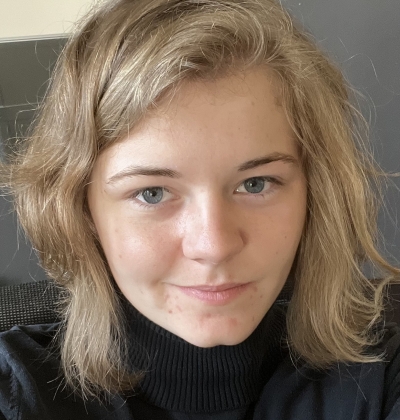
An Interview with an English and German Double Major
I met Frances '23 in our freshman fall at Dartmouth, during Orientation Week. She walked up to me in the library and said I had cool hair. A week later, we found ourselves in the same Shakespeare class—she could quote full sections of Hamlet from memory. We've been friends ever since, and I'm honored to get to introduce you all to her work and interests.
Q: Why did you decide to double major in German and English?
A: I came in knowing that I wanted to be an English major—I said so on my application. I also wanted to learn a new language at Dartmouth, because it'd probably be my only chance to do so this easily. I went to an open house with all the language departments and met a kind German professor. I'd already begun studying German on Duolingo, and as a result I placed into German 2. I was a bit scared of jumping ahead to German 2, but there were people at all different levels of German in the class, and the professor was very accommodating. I kept taking German classes because the professors were so nice, and I came to love German literature. It was very easy for me to add my second major, especially because I'd begun doing research with a German professor.
I also love the English department. Within the first couple weeks of taking an English class (Shakespeare, with you, Kennedy!) I fell in love. I kept taking classes and kept having fun in them. The department offers a broad range of classes, and you can also take different classes with the same professors, which helps you build relationships. For instance, I met my thesis advisor my freshman winter, so I knew her for the entirety of my time at Dartmouth. Getting to build those extended relationships with professors has been one of my favorite things here.
Q: Did you work on any research or projects?
A: I started doing research my freshman summer and sophomore fall with Professor Dever. She was working on the Michael Fields project—and I helped with both the transcription of the Fields journals and the book Dever was writing about Michael Fields (who was actually two female poets writing under the same pseudonym). I also researched in the German department with Professor Petra McGillen. We did work on English and German newspaper illustrations pre-photography. After I graduated, I continued working on translations with Professor McGillen, and a book of our translation work is going to be published shortly.
I also wrote an honors thesis about Virginia Woolfe and Oscar Wilde. It was about the figure of the artist and portraiture in two novels by Woolfe and one by Wilde. By studying those books, I was trying to get a better sense of artistic production and reproduction in the late Victorian and early modernist eras. [Kennedy's note: Frances won several English department awards for this excellent thesis.]
I also did a German major culminating experience—a short graphic novel about photographic portraiture of gender non-conforming women in the 1920s and 30s German speaking world—under Professor Yuliya Komska. [Kennedy's note: You can read an interview Frances did about her graphic novel here—it's super interesting and has tons more useful information about the German department!]
Q: What're you planning on doing now that you've left Dartmouth?
A: I am going to Cambridge University in the U.K. to get a masters degree in English. I'm also in the process of applying to PhD programs. I would love to teach at a place like Dartmouth, but that's in the far future.
Q: What resources have you taken advantage of while at Dartmouth?
A: It's amazing how much funding Dartmouth has available. I've gotten two grants from the Leslie Center for the Humanities for the projects I described to you. Also, Dartmouth's paying the majority of my master's degree tuition through the Reynolds Scholarship for Foreign Study.
Q: Do you think Dartmouth is a good undergraduate institution for students interested in English or German?
A: Absolutely. Dartmouth is great for anyone who loves those subjects, but especially for people interested in going into academia like I am, or curious about research. We have a ton of resources, and professors are generous with their time and expertise. Not very many people go into humanities academia after attending Dartmouth, so if you are interested in that path, you'll get a lot of individualized attention and a great jumping-off point to get your masters and PhD, like I'm doing.
Thanks, Frances, and thank you too, reader! The German department is small but wonderful; you can learn more about them on their department website. And likewise for the English department—although I plan on writing about my experience with them soon, so keep your eye out for that!


















